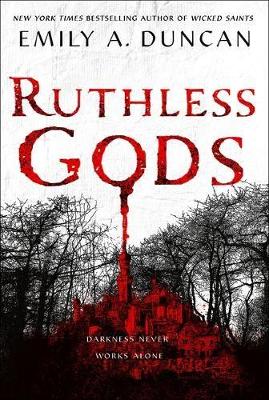Reviewed by Amber (The Literary Phoenix) on
There is still a little of the landscaping aesthetics I really liked in the first book, but ultimately, Ruthless Gods is here to talk about magic and the characters’ moving development into the world. We see the group take different turns, and we see them come back together again. And we continuously see that their will is ultimately stronger than the gods/monsters who play them like puppets. We spend a lot more time here talking about the different kinds of magic, introducing yet more kinds of magic, and introducing power through relics. We learn about an extended pantheon. There’s a lot of really cool world building opportunities, but I found myself constantly frustrated by the romantic interruptions. There’s a lot going on here, and one character even points out that it’s not an ideal time.
It’s not an ideal time.
Ultimately, I feel like Ruthless Gods exists to accomplish one thing that was managed in the last chapter, and mostly to build a love affair for our two still reigning main characters. I’m always going to be the first person to throw up the protest sign on a perfectly good YA fantasy being waylaid for an unconvincing love story, and hey! No time like the present! Nadya and Serefin both and problems that needed to be managed, the other characters too, and yet somehow we kept getting interrupted by random kissing.
Stop.
Additionally, there was a lot of … theorizing, I guess? There’s world building, then there’s info dumping. Then there’s “let me use more internal monologuing to try and build the tension between two difficult choices while info dumping”. There’s a lot going on inside these characters heads, and in choosing to focus on that, the pacing in Ruthless Gods became excruciating.
Example: there was a scene in the middle of the book where Shit Was Going to Go Down, and the atmosphere was amazing and the monster build up was amazing and then we switched perspectives away from the fight to Serefin’s head.
WHY.
I’ve complained about that sort of thing before, and after posting my review of The Return of the King, I’ve learned that there are people out there who love it, and are all in for a different side of the battle. And I am so happy for those people. Unfortunately, I am not one of those people, so I was consistently bummed out with the strong action sequences from the first book were replaced with ambling internal struggles.
And I get it. I do. The middle book in a trilogy is often a means to an end. There were moments that were fantastic, but Emily A. Duncan rushed through them so quickly that as a reader, I was left wanting. The motivations behind the romances make no sense to me, and I grew increasingly frustrated reading this. It took a readathon to get me to finish it, honestly, because the places where the writing stumbled far outnumbered the places where the writing wowed me. Even the word choice began to stand out. And I understand there are a limited number of synonyms for “darkness”. But even fantastic words like “eldritch” were overused and began to stand out like a sore thumb.
I believe Emily A. Duncan can do better than Ruthless Gods. And with the choices made in this middle book, I’m honestly unenthused to continue with the trilogy. I’ve never been one to stand idly by and watch an amazing fantasy world sacrificed to a love story, so I’m afraid I’m out. I’ll keep an eye on the author, because I believe she has something. I want to see more of her, but these characters do not have my heart.
Reading updates
- Started reading
- 21 October, 2019: Finished reading
- 21 October, 2019: Reviewed
